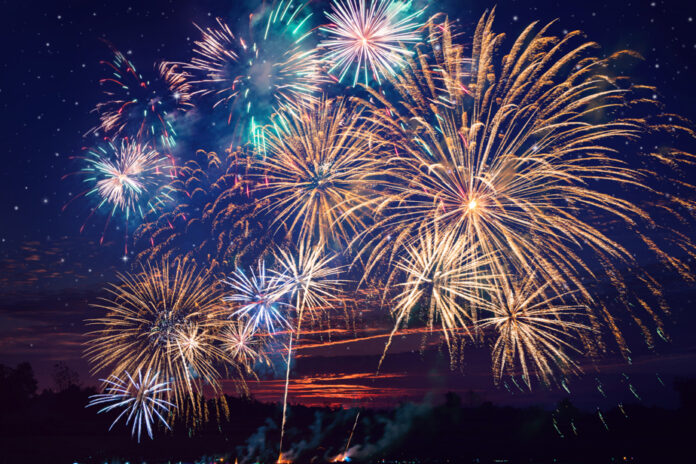Have you ever seen a fireworks show? Some people find it a magnificent explosion of sound and light. Others consider it noisy and above all, polluting. This is the case of the City of Mont-Tremblant, which has decided to ban fireworks. We’ll explain it to you!
You may know the Mont-Tremblant region, located in the Laurentians. There is a very popular large ski resort and national park there.
Every year, the City of Mont-Tremblant organizes celebrations to mark the National Day (June 24) and Canada Day (July 1). There are always fireworks that close these festive evenings.
But this tradition is over: a regulation has just been passed to ban fireworks.
The deputy mayor of Mont-Tremblant, Dominique Laverdure, explains that the explosives used in the fireworks release pollutants into the air and debris into the waterways. Animals also reportedly ate debris.
“We realized there’s nothing good about it, except the show,” the mayor said.
Marc J. Olivier is a chemical expert who studies hazardous materials. He collected data on the pollution caused by the big fireworks shows presented several times a summer in Montreal, near the Jacques-Cartier bridge.
The day after the fireworks, the researcher found that the air contamination exceeded “up to 30 times the established standards”. Emission standards are rules that limit the maximum amount of pollutants allowed in the air.
Yanick Roy, president of Royal pyrotechnie, a company that organizes fireworks, replies that there are laws that govern fireworks. For example, it is forbidden to use lead, which was used to make “star rain” effects, because it is a metal harmful to health.
For now, there is no other city in Quebec that has banned fireworks.
However, the City of Prévost, also in the Laurentians, canceled a fireworks show in February. Elected officials feared it would cause smog. Smog is a fog formed from a toxic mixture of gases and particles that is dangerous to health.
In Mont-Tremblant, the fireworks will be replaced by shows combining music and light effects. Not too bad, as a consolation prize?
This week was World Press Freedom Day. But what is freedom of the press? Does it really matter? Melanie tells you about it in this video!
Frédérick Lavoie is a Quebec journalist who is interested in everything that happens in the world. He has produced numerous reports, which can be read in particular in the newspaper Le Quotidien, and he has written four books. Freedom of the press is a very important subject for him, among other things because he has already found himself behind bars for simply doing his job!
He now works in India, where there are also obstacles to press freedom. He tells us about these challenges.
I worked in several other countries before, including Russia for four years. I chose to live in India because I wanted to go to a place where the ways of thinking and the ways of doing things were very different from those I already knew. I really wanted to be placed in front of other visions of the world than my own.
I’ve been living in India for about ten years and still today there are a lot of things that I don’t understand and that I discover every day! There are so many different languages, cultures and religions!
There are many threats to freedom of the press. For example, it is impossible for foreign journalists like me to travel to certain parts of India, such as Kashmir. In addition, the Indian government does not respond to questions from journalists. In nine years, Prime Minister Narendra Modi has never given a press conference.
I was in Belarus and I was reporting on young people demonstrating against the government. They were camping in the country’s capital to denounce elections they considered fraudulent. That means they thought the president had changed the outcome of the vote. I had spent the night there talking with these young people. After a few days the demonstration was declared illegal and I was arrested along with the demonstrators. I received a 15 day prison sentence.
I was scared at the time of the arrest. After that, I was no longer afraid. There was no violence in prison, even if it was not pleasant. Fortunately, I always see the bright side of things. There, I saw the inside of a Belarusian prison… For a journalist, it’s always interesting to have access to things like that!
I think the biggest obstacles are inside ourselves. Sometimes we tend to see only what looks like us. For journalists, who earn a good salary, it can be difficult to put themselves in the shoes of poorer people or richer people, or people who come from other cultures… There are very few immigrants in the newsrooms in Quebec.
This is essential because without freedom of the press, we are not able to look reality in the eye. If we believe lies, if we can’t express ourselves freely, if we can’t show the flaws of power, that gives societies that live in fear and that don’t dare to change.
Do you think you know the news well? Come take our quiz every Sunday on the Info Aces site to find out! You can also read news written for you, comment on them, ask your questions and take part in surveys, quizzes and contests. And check back every Sunday on the La Presse website for exclusive news and more! Remember that your curiosity is a superpower! Les As de l’info is an initiative of the Coops de l’information.


















